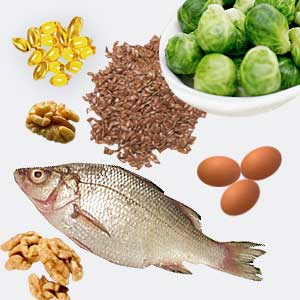Omega-3 Fatty Acids Could Help Treat ADHD in Children
An article by Bloch & Qawasmi published in the Journal of the American Academy of Child and Adolescent Psychiatry last year suggested that omega-3 fatty acids could improve ADHD in children. The effects were milder than the standard pharmacological treatments for ADHD, but given that omega-3s have few side effects, there would be little risk to using them to supplement traditional treatments or in cases where traditional treatments cannot be used.
Editors note: It would also be worth seeing if omega-3s helped mood symptoms too. A meta-analysis we wrote about here suggests that the omega-3 fatty acid EPA or the combination of EPA plus DHA has positive effects on depression in adults.
Fish Oil May Help Prevent Post-Partum Depression
 An article in Time Healthland last year reported that preliminary research shows that women who took fish oil during pregnancy experienced fewer symptoms of post-partum depression than women who did not take fish oil supplements.
An article in Time Healthland last year reported that preliminary research shows that women who took fish oil during pregnancy experienced fewer symptoms of post-partum depression than women who did not take fish oil supplements.
This data has not yet been replicated, but since there are few side effects to taking fish oil supplements, which are high in omega-3 fatty acids, the risk-to-benefits ratio suggests that there is no reason pregnant women shouldn’t take fish oil supplements to decrease the likelihood of depression after delivery.
We have written before about the possible benefits of omega-3 fatty acids.
Phosphatidylserine Omega-3 Fatty Acids in ADHD
Iris Manor reported at the 57th Annual Meeting of the American Academy of Child and Adolescent Psychiatry (AACAP) in October 2010 that phosphatidylserine (a phospholipid component) containing omega-3 fatty acids had significant positive effects in children with ADHD. These findings were notable because Manor and other investigators had previously found that omega-3 fatty acids themselves were not effective in ADHD, raising the possibility that the phosphatidylserine component offers unique therapeutic advantages. This compound is currently available in Israel and may become available in the US in the next year.
Diet, Depression, Inflammation and the Brain
We’ve been posting recently about diet and about treatments that are weight-neutral. There is evidence that diet, inflammation and depression are all linked. Epidemiological studies by Joe Hiblen have shown that in countries whose populations eat more fish and thus have high levels of omega-3 fatty acids in their diet, there is lower incidence of depression, suicide, and cardiovascular disease such as heart attacks and strokes. This may be because the major omega-3 fatty acids, EPA and DHA, are anti-inflammatory, and inflammation has been linked to depression. EPA inhibits the enzymes phospholipase A2 and cyclo-oxygenase-2 (COX-2), and their subsequent inflammatory effects on cytokines. DHA inhibits the pro-inflammatory cytokine IL6.
Researcher John Davis recently reviewed relevant literature and found that diets high in anti-inflammatory omega-3 fatty acids are associated with lower incidence of depression, cardiovascular disease, and markers of inflammatory processes. Conversely, diets high in fat and in inflammatory omega-6 fatty acids are associated with obesity, depression, and cardiovascular disease.
Various studies have shown the links between inflammation and depression. For example, when patients are given alpha-interferon to treat viral hepatitis, there is a subsequent increase in inflammatory cytokines IL-1 and IL-6, and depression often follows. Also, depressed patients have an increased ratio of pro-inflammatory to anti-inflammatory cytokines in their blood.
Another sign of a link between bipolar illness and inflammation can be seen in biochemical analysis of brain specimens obtained at autopsy. Researcher Rapaka Rao in the laboratory of Stanley Rapoport at the National Institute on Aging at the National Institutes of Health in Bethesda, Maryland, has reported that increased markers of neuronal inflammation and excitotoxicity were found in the brains of people who had had bipolar disorder. Phospholipase A2 and COX-2 were significantly elevated in the brains of those with bipolar illness and those with schizophrenia compared with controls. Pro-inflammatory interleukin I was also significantly increased in the brains of those who had had either illness. Read more
The Evolving Omega-3 Fatty Acid Story: The Icing on the Cake (And Why It Shouldn’t Be Eaten)
 Omega-3 fatty acids are important for brain development and function and are essential to the human diet since they cannot be synthesized by the body. Omega-3 fatty acids are derived from canola oil, walnuts, flax seed oil, leafy vegetables, and especially fish. The main omega-3 fatty acids include eicosapentaenoic acid (EPA) and docosahexaenoic acid (DHA). They have anti-inflammatory effects, unlike omega-6 fatty acids, which are pro-inflammatory. The omega-6 fatty acids come from soy, peanuts, corn oil, and meats, and are associated with increases in obesity, myocardial infarction, and stroke.
Omega-3 fatty acids are important for brain development and function and are essential to the human diet since they cannot be synthesized by the body. Omega-3 fatty acids are derived from canola oil, walnuts, flax seed oil, leafy vegetables, and especially fish. The main omega-3 fatty acids include eicosapentaenoic acid (EPA) and docosahexaenoic acid (DHA). They have anti-inflammatory effects, unlike omega-6 fatty acids, which are pro-inflammatory. The omega-6 fatty acids come from soy, peanuts, corn oil, and meats, and are associated with increases in obesity, myocardial infarction, and stroke.
In a recent review of the literature, John Davis and Joe Hiblen found that diets that include high levels of omega-3 fatty acids are associated with decreased incidence of depression, suicide, and cardiovascular disease. The researchers performed a meta-analysis of all the prospective depression treatment studies of omega-3 fatty acids compared to placebo. They found that EPA had antidepressant effects in humans, with moderate effect size and a high degree of statistical significance. DHA, however, did not appear to have an antidepressant effect, and pure DHA was even associated with some worsening of depression.
Editor’s note: This meta-analysis helps clarify some of the ambiguities in the literature about the antidepressant efficacy of the omega-3 fatty acids, clarifying that EPA alone is an effective antidepressant. The one study that did not find antidepressant effects with EPA was carried out by the Bipolar Collaborative Network, in which I am an investigator. Our study, published in an article by Keck et al., showed that 6g of EPA was not significantly more effective than placebo in bipolar depression or in rapid cyclers. However, there is some indication that 6g may be too high a dose of EPA, and most of the recommendations now suggest using 1-2g of either EPA or an EPA/DHA combination. Read more
One Expert’s Personal Treatment Algorithm for Bipolar Disorder in Young Children
EDITOR’S NOTE: Dr. Gagin Joshi of Massachusetts General Hospital, who presented the work on carbamazepine and lamotrigine on page 1 provided us with his own general treatment algorithm for youngsters with bipolar disorder.

Omega-3 Fatty Acids (photo from ironmagazine.com)
Joshi typically starts with 0.5 to 2 gms of omega-3 fatty acids because of their benign side-effects profile, the many studies suggesting they are effective in adult mood disorders, and a recent article indicating that they were effective in preventing the conversion of prodromal schizophrenia into full-blown illness in a randomized double-blind controlled study in Australia.
After the omega-3 fatty acids, Joshi’s second choice is typically the atypical antipsychotic aripiprazole (Abilify) because of its lesser degree of weight gain compared to atypicals quetiapine (Seroquel) or risperidone (Risperidol). Risperidone can be a third option if aripiprazole is not effective or tolerated.



